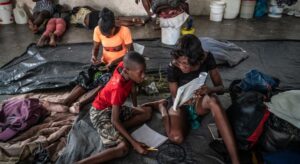
[ad_1]
Vishnu, 5, is happy to be back at school in the small village of Valachennai in Sri Lanka’s Eastern Province.
Vishnu, fueled by the nutrition he gets from the mid-day meal provided by the pre-primary school, is energetic, has a positive attitude towards schooling; and is eager to participate in pre-primary school activities.
Vishnu says, “I didn’t like coming to school earlier. I couldn’t concentrate on my studies and extra-curricular activities, because I always felt hungry. There wasn’t enough breakfast available at home.”
“My father had left us. I live with my mother, at my aunt’s place. My mother doesn’t work. She helps her aunt in taking care of the house and children.
Vishnu’s 24-year-old mother, Peersanthini, works tirelessly to educate her son. She told, “Ever since my husband left us, maintenance has been a challenge. The situation has become worse due to the economic crisis. I live here with my sister. Here I have a roof over my head, and I get two meals a day.”
The Valachchenai community mainly depends on agriculture and fishing for survival. Access to basic services such as health and transport is limited in his village. The economic crisis that started in 2022 has further increased their sensitivity.
lack of understanding
Vishnu’s pre-school teacher Kavita said that these children and their families were not only financially poor, but were also unaware of the nutritional needs of the children.
She said, “Since I belong to this community, I understand the issues in my community and the deprivations that children are facing, which have become worse due to the economic crisis.”
Families across the country are grappling with the harsh realities of economic hardship, which has taken a toll on children’s education, health and overall well-being. As a result, children face barriers to growth and learning and a higher risk of various forms of undernutrition – especially young children, as they are at risk of missing out on even their basic nutritional needs.

In response, UNICEF supported nutrition-sensitive feeding programs at the pre-school level, in collaboration with local authorities in eight of the most deprived districts. This program started in September 2022, which aims to ensure continuous access to nutrition and education of young children.
To date, the pre-school feeding program is reaching over 37,000 children from over 1,500 resource-constrained pre-schools and day care centers in eight districts.
Funding for the program in seven of the eight districts has been provided by the UNICEF Australia office.
Kavita explains, “Having a meal in the morning is very beneficial for children. As a teacher, I am happy to get this opportunity to change the lives of my children.”
Expressing a commitment to communal solidarity and the welfare of the youth, the mothers of the pre-school students have taken up the responsibility of preparing and serving the meals.
Mahela, 27, a member of the committee, says, “A committee of mothers has been formed to oversee the overall meal program. We have encouraged mothers to cook meals for the children at school, as well as to spend nutritious time in the school premises and at their homes. and entrusted with the responsibility of ensuring quality food supply.”
“With the help of the mothers from food procurement, preparation and serving, teachers are able to focus their attention on education. This gives us a sense of ownership and makes the program sustainable.”
solidarity in the community
Shantirakala, a pre-school teacher, says, “This meal program has brought the community together. Children are now getting nutritious food, reducing the burden on families. Due to the meal program, children have sustained school attendance and they are actively contributing in curricular and extra-curricular activities.
“The support from UNICEF Australia is vitally important and much appreciated,” said Takaho Fukami, UNICEF Chief of Education in Sri Lanka. “The nutrition-sensitive pre-school feeding program not only helps meet the immediate humanitarian needs of vulnerable children, but It also has a lasting impact on the critical life cycle of a child’s childhood, in which a solid foundation for life-long learning and holistic development must be laid.”
“The humanitarian needs in Sri Lanka continue and there is a dire need to mobilize more resources to scale up this vital programme. It is essential support that UNICEF is working with as a trusted partner to the government and school communities and whose positive impact will be felt by generations to come.”
[ad_2]
Source link





